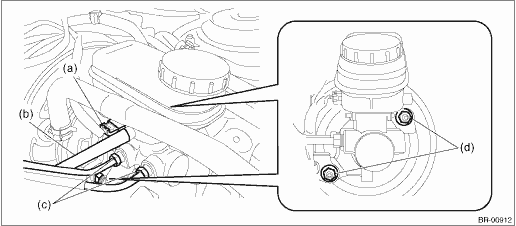Subaru Crosstrek Service Manual: Removal
BRAKE > Master Cylinder
REMOVAL
CAUTION:
• Do not allow brake fluid to come in contact with the painted surface of the vehicle body. If it does, wash off with water and wipe away completely.
• Prepare a container to catch grease or oil, etc. If any grease or oil spills, wipe it off and clean immediately to prevent from penetrating into floor or flowing outside.
1. Disconnect the ground cable from battery and wait for at least 60 seconds before starting work. NOTE">
2. Drain brake fluid from the reservoir tank completely.
3. Remove the master cylinder assembly.
(1) Disconnect the fluid level gauge connector (a).
(2) Disconnect the clutch hose (b). (MT model)
(3) Disconnect the brake pipe (c).
(4) Remove the nut (d), and slowly remove the master cylinder assembly from the vacuum booster assembly.

 Assembly
Assembly
BRAKE > Master CylinderASSEMBLYCAUTION:When replacing the reservoir tank, adhere the label to the position shown in the figure. (C5 model)Preparation items:C5 modelPart No.: Label (25080GA010)(a)La ...
 Disassembly
Disassembly
BRAKE > Master CylinderDISASSEMBLY1. Remove the reservoir tank.CAUTION:Be careful not to tighten a vise excessively.(1) Place the master cylinder assembly between aluminum plates and fix it on a vi ...
Other materials:
Inspection
CONTINUOUSLY VARIABLE TRANSMISSION(TR580) > Turbine Speed SensorINSPECTION1. Set the ST between the TCM and bulkhead harness.ST 18460AA040CHECK BOARD2. Set the probe of oscilloscope to the check board connector.Connector & terminalNo. 12 (+) — No. 42 (−):(A)+ probe(B)− probe3 ...
Note
SUNROOF/T-TOP/CONVERTIBLE TOP (SUNROOF) > Sunroof Control SystemNOTEFor operation procedures of each component of the sunroof control system, refer to the respective section.• Glass lid: Glass Lid">• Sunroof assembly: Sunroof Assembly">• Sunroof motor: Sunroof ...
Inspection
BRAKE > Brake BoosterINSPECTION1. OPERATION CHECK WHEN NOT USING MEASURING DEVICESCAUTION:When checking operation, be sure to apply the parking brake securely.When an operation check is performed with no measuring devices, a faulty part cannot be identified correctly. But it is possible to identi ...
